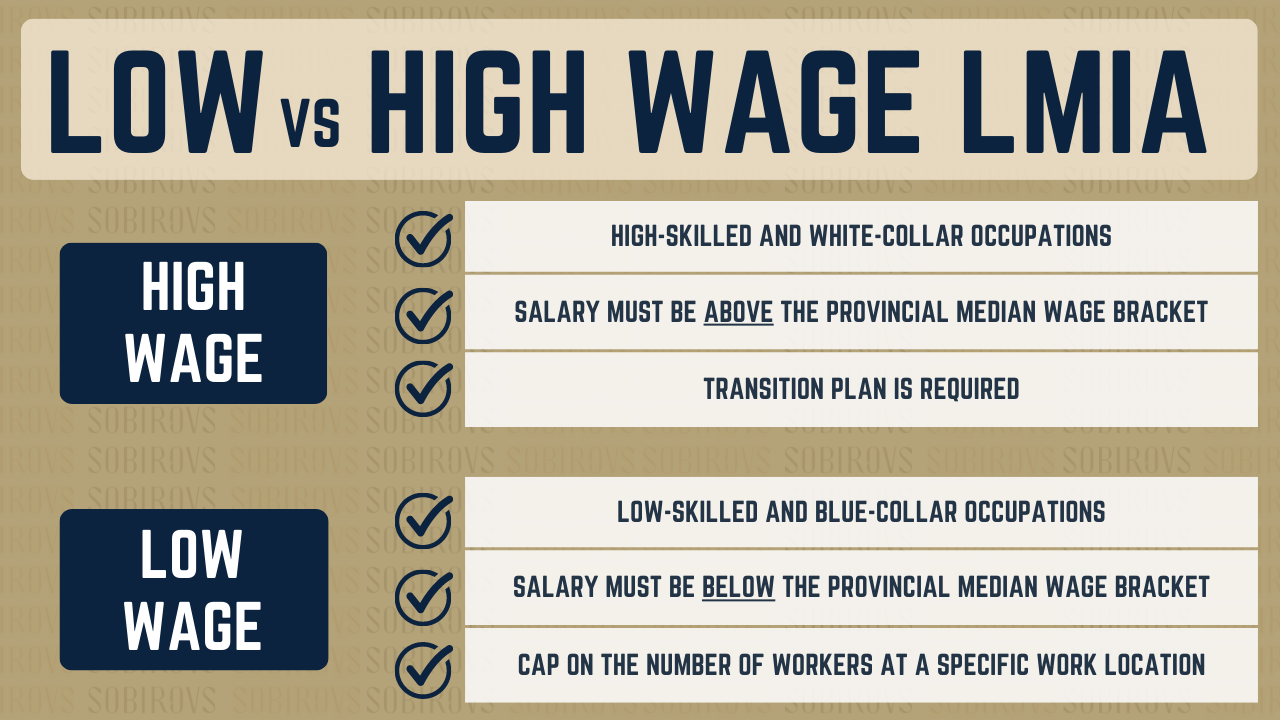Low-Wage LMIA is a dependable tool Canadian companies use to address labour market shortages and tackle the low-skilled or blue-collar worker shortage. In addition, Low-Wage LMIA allows Canadian companies to address challenges such as high turnover rates, disengagement, employee loyalty, diversity, and salary expectations. Despite common misconceptions that a Low-Wage LMIA application is very complicated and has a high chance of being refused, we assure you that with proper resources and support, it can be a seamless process with a high chance of approval. In this detailed article, you will find answers to all your questions related to the Low-Wage LMIA application process.
If you’re feeling overwhelmed by the prospect of hiring skilled international talent, we understand. But with the proper guidance and resources, it can be a seamless process that provides immediate relief for your business needs. At Sobirovs Law Firm, we’re confident in our ability to make the process quick and effortless. Our commitment to helping your business grow in the face of labour challenges is unwavering. Schedule a consultation today and get started.

What is a Low-Wage LMIA?
Low-Wage LMIA is used to hire low-skilled international talent to address labour shortages by Canadian companies. The Low-Wage LMIA stream is a specific category within the Labour Market Impact Assessment process designed for employers hiring temporary foreign workers. Many Canadian companies across all sectors use it – companies from any industry are welcome to utilize Low-Wage LMIA to hire skilled talent from abroad if they struggle with recruiting and retaining skilled employees. Low-Wage LMIA also has no restrictions on which countries the Canadian company can hire foreign workers from. Nor are there limits on how often a Canadian company can use the Low-Wage LMIA program.

What is a Prevailing Wage for a Low-Wage LMIA?
Foreign workers hired through Low-Wage LMIA generally come to work in low-skilled or blue-collar occupations, assuming their offered salary is below the prevailing wage level.
The prevailing wage is the median wage, depending on the region and occupation. As of today, the general provincial median prevailing wages are as follows:
| Province | Prevailing Wage | Province | Prevailing Wage |
|---|---|---|---|
| Alberta | $28.85 | Nova Scotia | $22.97 |
| British Columbia | $27.50 | Nunavut | $35.90 |
| Manitoba | $23.94 | Ontario | $27.00 |
| New Brunswick | $23.00 | Prince Edward Island | $22.50 |
| Newfoundland and Labrador | $25.00 | Quebec | $26.00 |
| Northwest Territories | $38.00 | Saskatchewan | $26.22 |
| Yukon | $35.00 |
Difference Between Low-Wage LMIA and High-Wage LMIA
While both programs are part of the Temporary Foreign Worker Program and involve labour market impact assessments, Low-Wage LMIA is primarily used to hire foreign talent in low-skilled or blue-collar occupations with a target salary below the prevailing wage. High-Wage LMIA is used mainly to hire foreign talent to work in high-skilled or white-collar occupations with high wage stream and a target salary above the prevailing wage.

General Low-Wage LMIA Requirements
The Canadian company looking to hire a foreign worker through a Low-Wage LMIA must be active and operational with enough resources to support the foreign worker’s salary and not be on the list of ineligible employers. Before starting a Low-Wage LMIA application, reviewing program requirements for advertisements and understanding what a cap for low-wage temporary positions is is important. The maximum employment duration for a temporary worker under the Low-Wage LMIA program is generally 1 year, with certain exceptions.
Find out about Canada’s Global Talent Stream.
Advertising Requirements
The advertisement period is a mandatory component of Low-Wage LMIA applications and must run for 4 weeks before the application can be submitted. One advertisement must be posted on Job Bank, and the other 2 must be posted on platforms targeting under-represented groups such as indigenous persons, vulnerable youth, newcomers and persons with disabilities.
Recruitment activities dictate 80% of the success rate of a Low-Wage LMIA application; as such, it is extremely important to ensure that the advertisements are prepared and posted exactly as per program requirements. It is also important to consider the unemployment rate in the area, as it can impact the eligibility to hire temporary foreign workers.
Cap for Low-Wage Positions
There is a limit, or a cap, on how many foreign workers you can hire under the low wage stream depending on how many existing employees are already working in the same position at the same location. Currently, the cap on low-wage positions is set at 20%. Thus, for example, if you are employing 10 workers, you can only employ 2 low-wage LMIA workers at the same work location.

Recruitment Requirements for Low-Wage LMIA
The recruitment must run for 4 weeks, and advertisements must be posted on Job Bank and 2 other platforms that target under-represented groups to hire temporary foreign workers. Under-represented groups are:
-
Indigenous persons
-
Vulnerable youth
-
Newcomers
-
Persons with disabilities
Learn all about Canada Tech Visa options.
Processing Time for Low-Wage LMIA Applications
Once submitted, a Low-Wage LMIA application can take up to 8 weeks to process. Processing times are never guaranteed and are always subject to change. Service Canada, under Employment and Social Development Canada, often updates the information on the actual processing time based on real-time data.
A variety of factors influence the processing time for a Low-Wage LMIA application. These include the completeness and accuracy of the application, the volume of applications received by Service Canada at any given time, any special circumstances surrounding the employer or potential employee, and changes in immigration laws or policies.

Tracking and Recordkeeping – Recruitment Efforts
During the first 30 days, you must complete the Job Match service through Job Bank – you must invite any applicant of 2 stars and above to apply. If you indicate in all your advertisements to send a resume via email, please check that email regularly to track applicants – you need to keep a record of applicants that are Canadian citizens or permanent residents.
Those who meet the job requirements must be invited for an interview, and records of those interviews must be kept. Those that don’t meet the job requirements must be recorded for data. For the Low-Wage LMIA application, you must provide proof that advertisements were active for 4 weeks in addition to a recruitment effort summary – the same documents must be retained for 6 years. Monitoring unemployment rates is also crucial, as it can influence the eligibility to obtain a Labour Market Impact Assessment.
Eligibility Requirements for Canadian Employers and Foreign Workers
General requirements ask that the Canadian company looking to hire foreign workers is a Canadian-registered business that is not on the list of ineligible employers and has the financial capacity to pay the wages of foreign workers.
-
The Canadian company must cover the transportation expense of bringing the foreign worker to Canada and for the return to their home country after the employment engagement ends. In addition, the Canadian company must support the foreign worker in finding affordable housing. Employers must also consider the territorial median hourly wage when determining the appropriate LMIA application route.
General requirements for foreign workers are to be eligible for the job, be admissible to Canada, and obtain proper work authorizations before the first day of work.

Canadian Employer Requirements
When Canadian companies apply for a Low-Wage LMIA, they are assessed to confirm that the business and job offer is legitimate and genuine. This means that the Canadian company is operational and has the financial capability to support the foreign worker’s salary.
In specific, the Canadian company will be assessed to confirm that:
-
It provides goods or services in Canada – a Canadian-registered and operating business.
-
The position requested in the Low-Wage LMIA application aligns with the business’s needs.
-
It can fulfill all terms of the job offer – meaning the Canadian company has the financial ability to pay the foreign worker’s salary and provide a workspace safe from abuse.
-
It has no compliance issues and is not on the list of ineligible employers.
Employers must ensure that the offered hourly wages meet the required standards for the position.
If you are a Canadian company located in British Columbia, Saskatchewan or Manitoba, you must acquire a provincial employer registration certificate to be able to hire foreign workers. This certificate is an additional authorization that must be acquired before submitting a Low-Wage LMIA application.

Foreign Worker Requirements
There are no restrictions on the country of origin for eligible Low-Wage LMIA workers. However, they must meet certain requirements, including having the relevant experience that matches the job description, being able to communicate in either English or French, having a clean criminal record, and being in good health. These requirements help ensure that foreign workers can effectively address labour market shortages in Canada.
Application Process for Low-Wage LMIA Workers
The LMIA application process for low wage lmia applications starts with the 4-week advertisement and recruitment period. During this time, you must review resumes from applicants that are Canadian citizens or permanent residents.
If the recruitment effort is fruitless, an application can be put together using the online portal for LMIA application form completion. With the application form, you must upload documents such as:
-
Business legitimacy documents
-
Proof of advertisements
-
Recruitment Summary
How Much is the Application Fee for Low-Wage LMIA?
Once submitted, the application can take approximately 8 weeks to process. During this time, you will be asked to make an application fee payment of CAD 1,000 per position and might be invited to attend an interview with an ESDC officer to discuss the labour market impact assessments.
Interview with ESDC
Interviews with officers from Employment and Social Development Canada (ESDC) are very informal – the officer only calls to verify the information in the application and ask follow-up questions in case they have any. They will ask to introduce the business, some basic information about the role and why there is a need for a foreign worker.

Mandatory Documents for the Low-Wage LMIA Application
Surprisingly, ESDC doesn’t ask for many documents for labour market impact assessments in a Low-Wage LMIA application. The most common documents that are being asked for are:
-
CRA-issued T2 Schedule 100 and 125
-
PD7A form or T4 Summary of Remuneration paid.
If the Canadian company had a recently approved LMIA application within the last 2 years, then the positive decision letter can be used on its own without any additional documents.
For brand-new companies that don’t have the above-mentioned documents, an attestation letter from a licensed lawyer or a licensed accountant will be accepted, along with a corporate bank statement and business incorporation documents.
Employer Compliance
Canadian companies must adhere to a set of regulations and guidelines known as employer compliance when hiring temporary foreign workers. These regulations are in place to ensure that foreign workers are treated fairly and receive the same rights as Canadian employees.
Overall, ESDC looks at the following conditions to ensure that Canadian companies remain compliant:
-
Complying with all federal, provincial, and/or territorial laws regulating employment and recruiting.
-
The foreign worker obtains a signed offer letter on the first day of work (or earlier) that clearly outlines all relevant details associated with their employment.
-
All relevant records concerning the Low-Wage LMIA application are kept for 6 years.
-
This includes any recruitment records that were conducted for the role (if there were any), communication threads with the applicant, communication records with any third party involved in this process, the submitted application, expenses, communication threads with the ESDC officer, copy of the final decision letter, and anything else that is relevant.
-
Commitment to covering transportation costs and finding affordable housing.
-
Informing ESDC of any changes to the foreign worker’s employment conditions.
-
Providing a safe working environment to the foreign worker that is free of abuse and has proper safety measures depending on the industry standards.
-
Maintaining the same employment conditions in the Low-Wage LMIA application and the signed offer letter.
-
The company remains engaged in the same business for the duration of the foreign worker’s work permit.
-
For example, if the business is acquired or re-branded, the foreign worker may need a new LMIA to reflect employment records accurately.
-
The fees associated with recruitment and bringing the foreign worker to Canada (for example, Low-Wage LMIA service fees and/or work permit fees) are not recovered, directly or indirectly, from the foreign worker.
Frequently Asked Questions About Low-Wage LMIA in Canada
Below, you will find answers to the most commonly asked questions on this topic:
As of today, the general provincial median wages are as follows:
| Province | Prevailing Wage | Province | Prevailing Wage |
|---|---|---|---|
| Alberta | $28.85 | Nova Scotia | $22.97 |
| British Columbia | $27.50 | Nunavut | $35.90 |
| Manitoba | $23.94 | Ontario | $27.00 |
| New Brunswick | $23.00 | Prince Edward Island | $22.50 |
| Newfoundland and Labrador | $25.00 | Quebec | $26.00 |
| Northwest Territories | $38.00 | Saskatchewan | $26.22 |
| Yukon | $35.00 |
- The LMIA process starts with a 4-week recruitment period that is used to see whether there are available Canadian citizens or permanent residents for the job.
- If there are none, an application for a Low-Wage LMIA can be put together with supporting documents.
- Once submitted, you must make a payment of CAD 1,000 per position and await an interview with the ESDC officer.
- Pending a successful interview with an ESDC officer, a final decision letter will be issued after approximately 8 weeks from the time the application was submitted.
- 2%
- The prevailing wage
- Statistics Canada’s Consumer Price Index, the annual inflation rate of the previous year. The inflation rate in 2022 was 6.8%
You can’t give them a promotion – you would then require a new Low-Wage LMIA to support their new role. However, if the foreign worker obtained permanent residence by then, you can give them a raise and a promotion.
- At first, the Canadian employer must not be on the list of ineligible employers and not be banned from the Temporary Foreign Worker Program.
- Then, conduct a 4-week recruitment period with properly prepared advertisements that are placed in relevant places.
- Next, the preparation of the application itself – the form needs to be fully completed and supplemented by relevant documents.
- Once the application is submitted, await instructions to make a mandatory government fee payment of CAD 1,000 per position and attend an interview with the ESDC officer.
If you want to offer the position to the suitable applicant and proceed with the Low-Wage LMIA, you can still do that, however, you will need to address the reason behind why you still need the foreign worker.
You can also offer a different role to a suitable applicant if they are fit for another position and proceed with the Low-Wage LMIA for the foreign worker.









